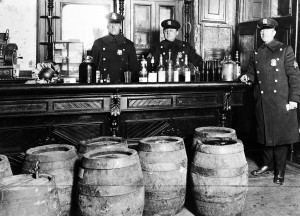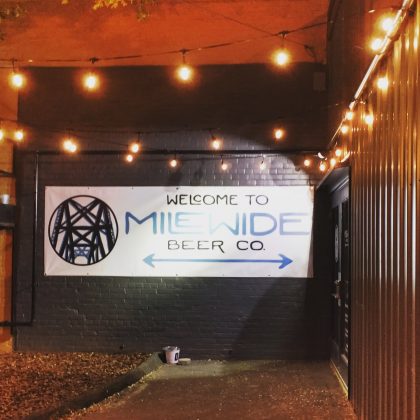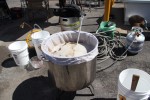 “Drinking should be done in the privacy of one’s own home — where it’s necessary.” -Phil (Abe Vigoda) Fish, on “Barney Miller”
“Drinking should be done in the privacy of one’s own home — where it’s necessary.” -Phil (Abe Vigoda) Fish, on “Barney Miller”
Last week I shuffled down to the drug store to buy a tube of toothpaste, and while waiting at the corner to cross the street, a Wal-mart semi-trailer truck came barreling toward the intersection. There wasn’t enough room for him to make the turn, and I had to scurry for cover as those big wheels popped up on the sidewalk.
“You asshole,” I screamed. “Wal-Mart sucks!”
And yet, this somehow seemed incomplete. “I bet you drink Bud Light Lime, too!”
“Happy Days” is more than an incredibly vapid television series from the moldy goldie days of white-bread American television.
They’re also the only promotional option for watering hole operators in Indiana, where Happy Hour is verboten. Back in the 1980s, about the same time that Fonzie mercifully disappeared from the airwaves, Mothers Against Drunk Drivers successfully lobbied Hoosier legislators for an end to reduced price drink specials offered during certain times of day, or as available only to specified classes of customer.
Since then, alcoholic drink price reductions in Indiana have been mandated as non-discriminatory and uniform for all drinkers. There can be neither Ladies Night, nor cheap pitchers during the game; preferential pricing must last the whole day through.
I won’t argue against the notion that reducing impaired driving is a legitimate goal of government. At the same time, nanny laws like Indiana’s ban on Happy Hour squelch the entrepreneurial spirit, and taken in concert with other regulations, they sometimes also have the effect of worsening what they purport to correct.
Admittedly, cheap drinks during a Happy Hour time limit might lead to hurried over-indulgence, but if it’s Happy Day, one has far longer to over-indulge. Give me the latter, any time.
None of this is unusual for those of us who work in the beverage alcohol business. We learn quite early in our careers that pious homilies about the free market seldom apply to us. The peculiar cognitive dissonance of America’s fiscal vs. theological upbringing – Mammon vs. the Eternal Kingdom, as it were – has served to reinforce two enduringly interconnected political positions: First, that the consumption of beverage alcohol is a dastardly and sinful curse borne of Satan’s hand, and second, that any sin so provocatively widespread and ineradicable is a veritable cash cow to be hyper-regulated and onerously taxed without recourse to consistency or common sense.
As example of the latter, consider Indiana’s “flip a coin” attitude toward alcohol sales on the Sabbath.
When it comes to alcoholic beverages served in bars and restaurants strictly for on-premise consumption, Sunday sales are low-hanging fruit ripe for the plucking of tax revenues, but they’re metaphorical apples in the Garden of Eden in the sense of carry-out sales.
There are two recognized carry-out exceptions: Licensed small breweries and wineries may ignore the off-premise Sunday rules — the wineries for many years, and the breweries since 2010. However, these entities might conceivably combine for only a percentage point or two of sales in the state, so it’s small beer (and vino) in the context of the larger off-premise picture.
Granted, I’m an alcoholic elitist of long standing, and this particular Sunday sales exception is nicely beneficial for my own brewing business. Even so, it’s hardly fair in the cosmic sense. If there are good reasons to let breweries and wineries sell carry-out beer and wine on Sunday, how do these reasons not apply to package stores and supermarkets?
And: Wouldn’t an expansion of Sunday carry-out sales further the state’s overt goal of reducing impaired driving every bit as much as eliminating Happy Hour?
As it stands in Indiana, if you’re not fortunate to live near a small brewery or small winery, you cannot buy alcoholic beverages on Sunday to take home for consumption within crawling distance of your own bed. Instead, you must hop into the car in a state largely devoid of public transportation and drive to a bar or restaurant for on-premise consumption, which means you must drive back home at some point, whether below or above the legal limit.
It seems to me the tax revenue would increase, impaired driving would decrease, and overall, more money would stay inside the state if all carry-out sales were permitted on Sunday.
Not that I’m complaining, but as part of the same 2010 reform package that allowed carryout beer sales from small breweries, Indiana’s lawmakers pushed on-premise alcohol sales hours back to 7:00 a.m. (from Noon) on Sunday morning, and removed the prohibition of all sales on Election Day. But all alcohol sales remain illegal on Christmas Day (separation of church and state, anyone?), and carry-out sales are still banned on New Year’s Day.
Happy yet?
Roger A. Baylor
New Albanian Brewing Company





